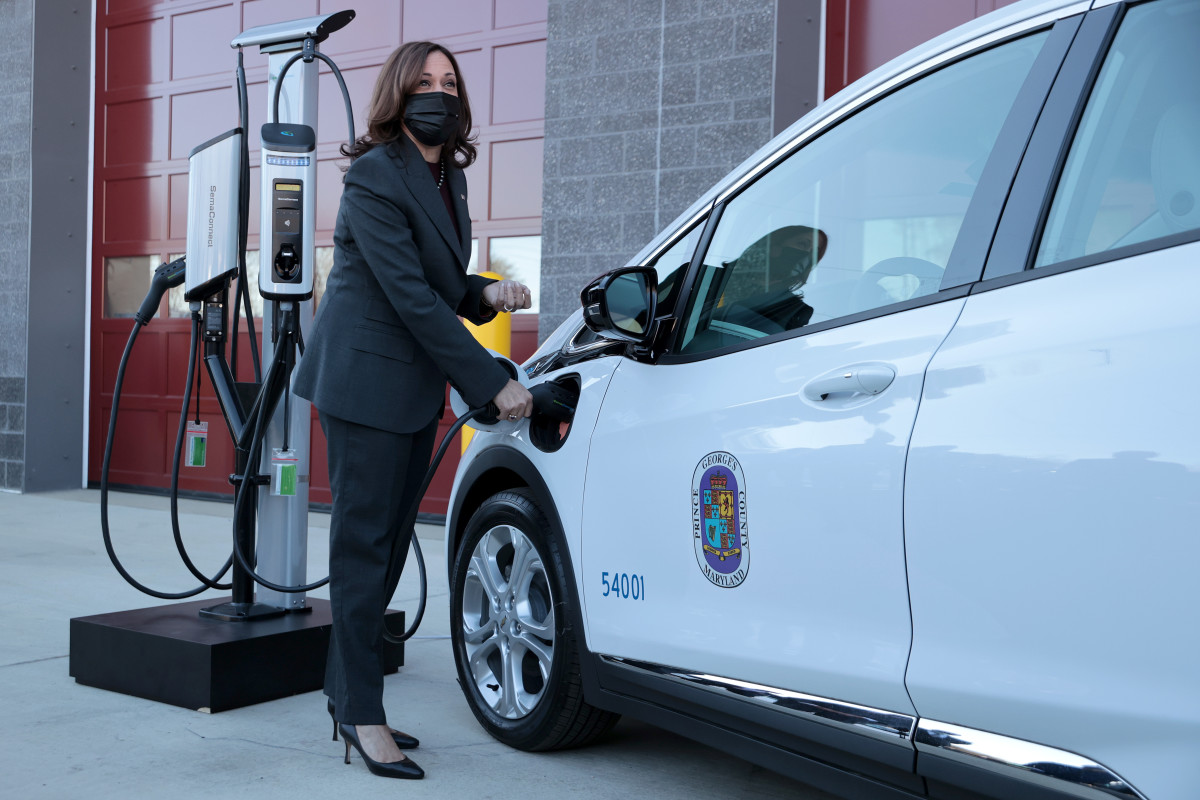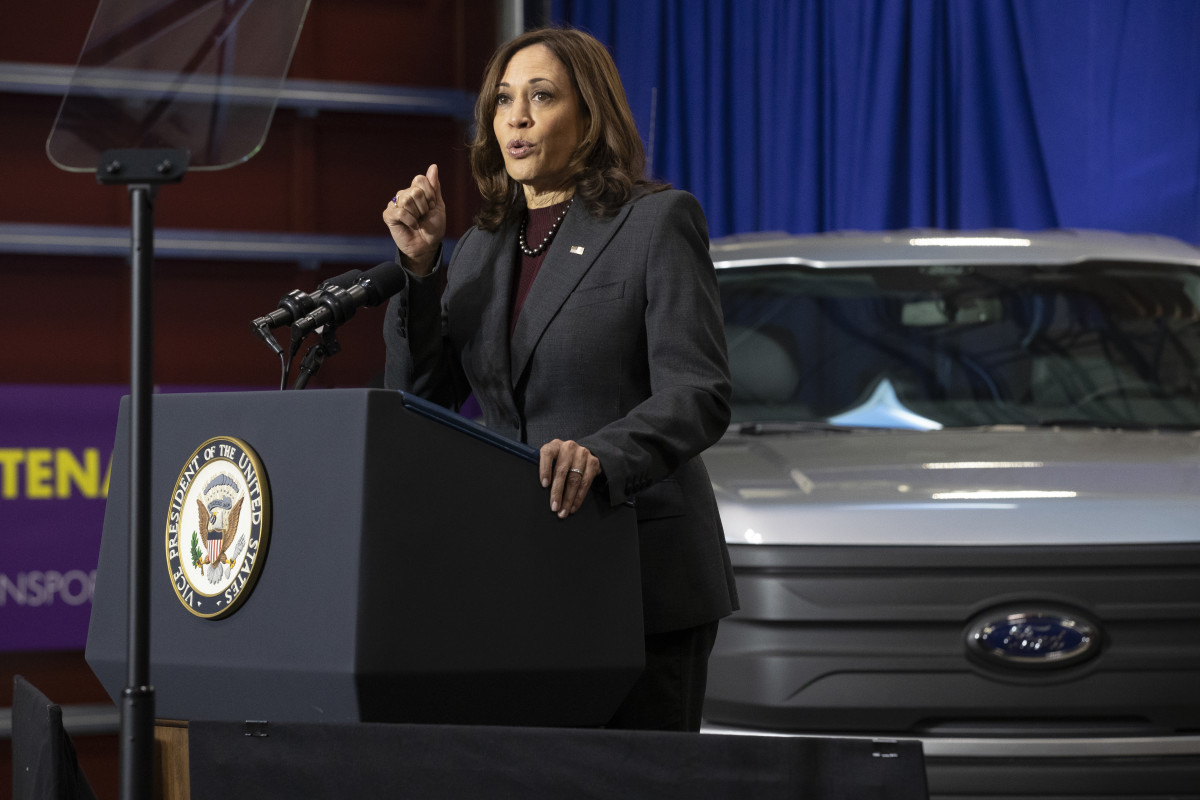
After weeks of pressure stemming from his performance at a televised presidential debate against the present Republican presidential nominee Donald J. Trump, President Biden made the stunning announcement on July 21 that he would not be seeking reelection.
In the same announcement, the President endorsed the current Vice President, Kamala Harris, for the Democratic Party nomination. She is also supported by other key congressional lawmakers and the governors of several key states.
Related: Here's what happens to Biden’s $96 million campaign fund
With the 2024 Democratic National Convention taking place in Chicago, Ill. on August 19-22, many questions about her record will be asked, and her positions on key policy issues will be scrutinized by the world's political pundits and cable news networks.
However, one key issue, electric cars and EV adoption, has been a political boogeyman for Trump and is also part of an even larger Harris position on the environment and climate change.

Harris' battle against climate change
Before her tenure as the Vice President of the United States, Kamala Harris previously served as a U.S. Senator representing California and was also the state's attorney general. She took a staunch stance against fossil fuels and other drivers of climate change in both positions.
During her time as California AG from 2011 to 2017, Harris' office investigated oil giant Exxon Mobil (XOM) over its handling of knowledge about fossil fuels' impact on climate change and whether its public statements broke securities laws and other environmental protections.
Additionally, in 2016, Harris brought a case against one of the world's largest automakers, Volkswagen, for its involvement in the notorious "Dieselgate" scandal. The scandal was a fall from grace for the German automaker, as it revolved around using so-called "defeat devices" installed on its cars to fraudulently pass diesel emissions tests.
According to Reuters, the automaker was ordered to pay $86 million to the AG's office in addition to a previous $14.7 billion settlement to U.S. officials.
More Business of EVs:
- Porsche and Mercedes diverge at EV crossroads
- A Fisker-type problem is affecting an automaker known for quality
- Police officer pulls over Waymo robotaxi, is greeted by no driver or passengers
As a U.S. Senator, Harris was an early adopter of the Green New Deal. Penned by Sen. Ed Markey (D-MA) and Rep. Alexandria Ocasio-Cortez (D-NY), the controversial legislation was a non-binding agreement that would guide the United States towards 100% clean, renewable energy by 2030.
The climate proposal included an overhaul of American transportation systems "to remove pollution and greenhouse gas emissions," which included investment in "zero-emission vehicle and non-motorized alternative modes of transportation infrastructure and manufacturing." The checklist also called for job guarantees and a national healthcare system.
During her first attempt as a presidential candidate in 2019, Harris captured much of the same energy as part of her "Climate Plan For the People;" a $10 Trillion "investment" to "achieve a clean economy by 2045."
According to Ballotpedia, her campaign website said that the plan aimed to accelerate "the spread of electric vehicles, solar panels, and wind turbines" and make big investments "in battery storage, climate-smart agriculture, advanced manufacturing, and the innovative technologies that will build our carbon-free future."
With said plan in place, the goal was to achieve "100 percent carbon-neutral electricity" and zero-emission "buses, heavy-duty vehicles, and vehicle fleets." Additionally, Harris called for a "climate pollution fee" aimed at entities known to emit greenhouse gases and emphasized that enforcement and prosecution of fossil fuel entities would be strengthened with Harris in the White House.
Additionally, in a statement made at a CNN climate change forum in 2020, Harris said she opposes fracking and offshore oil drilling.

While some of these policies seem far-fetched, Harris' tenure as VP indicates that she would be a driver in some of the Biden-Harris Administration policies that are already making progress in shaping the future of the automotive industry.
On May 6, Vice President Harris announced the administration's $100 million investment towards small and medium-sized auto parts suppliers to upgrade their facilities for EV production.
As per the White House, a large chunk of the funding is meant to "keep good, good-paying and union jobs in the same communities as automakers and auto suppliers transition to electric vehicle manufacturing here in America," while the rest is set aside to improve suppliers' "improve their facilities' energy and material efficiency, cybersecurity, or productivity, or reduce the greenhouse gas emissions."
However, not all of the Biden-Harris Administration plans have born ripe fruit yet. In March 2024, the Washington Post reported that the Administration's $7.5 billion plan to build EV chargers has only produced seven chargers in four states since Congress approved the bill in 2021 as part of the Bipartisan Infrastructure Law.
Biden vowed to build 500,000 stations across the country by 2030, but lawmakers from both parties expressed doubts in a letter penned to Secretary of Energy Jennifer Granholm and Secretary of Transportation Pete Buttigieg.
"We have significant concerns that under your efforts American taxpayer dollars are being woefully mismanaged," wrote Cathy McMorris Rodgers (R-Wash.), Jeff Duncan (R-S.C.) and Morgan Griffith (R-Va.). "The problems with these programs continue to grow — delays in the delivery of chargers, concerns from States about labor contracting requirements and minimum operating standards for chargers."
Industry support
Besides lawmakers' support, Vice President Harris has also garnered praise from an important ally.
In a statement on July 21, shortly after the President's announcement, the United Auto Workers union praised Biden for "passing the torch to a new generation." The union also praised Vice President Kamala Harris for walking "the picket line with us in 2019 and, along with President Biden, has brought work and jobs back to communities like Lordstown, Ohio, and Belvidere, Illinois."
"That’s the legacy President Biden leaves, and that’s the work we will continue to build on as a union."
Related: Veteran fund manager sees world of pain coming for stocks







